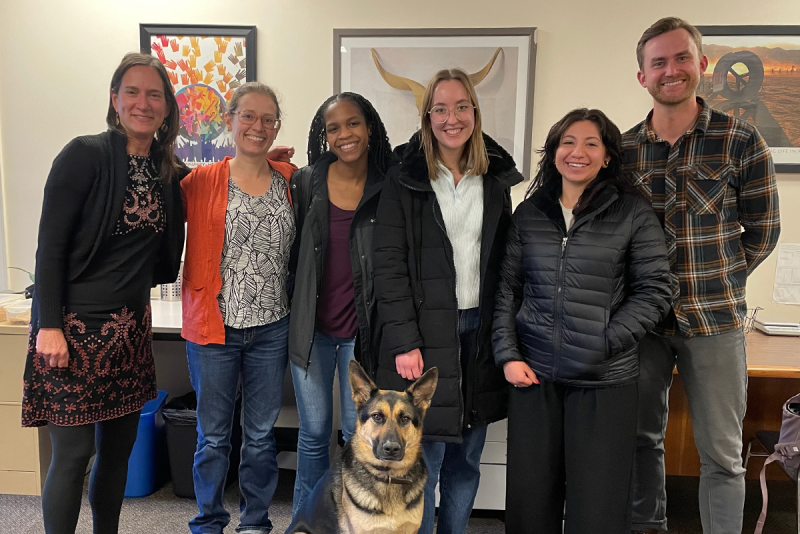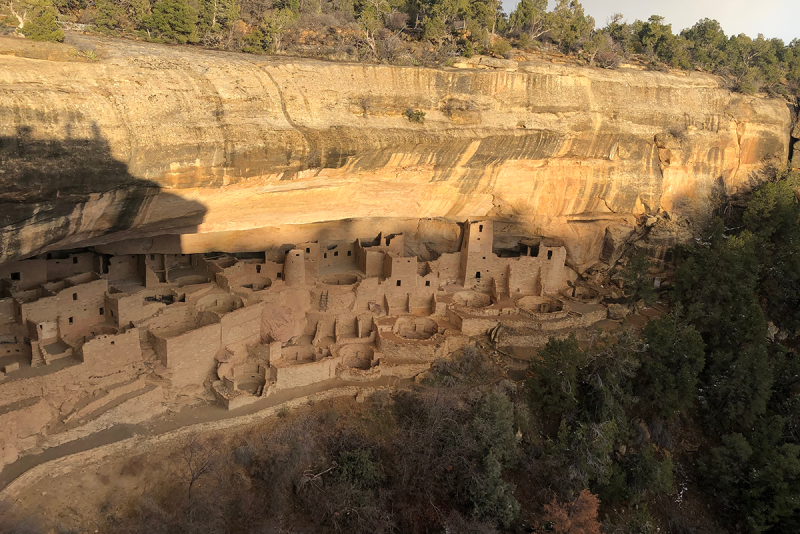Students Provide Legal Support in Durango with Return of Alternative Spring Break

Students from the University of Denver Sturm College of Law (and a canine companion) in Durango, Colorado, during Alternative Spring Break, March 25-27, 2024.
More than a decade ago, students at the University of Denver Sturm College of Law began engaging in an atypical activity during their hard-earned Spring Break week: giving some of that time away to provide legal and law-related support to communities in need. As with many other annual traditions that were waylaid by the COVID-19 pandemic, Denver Law’s Alternative Spring Break (ASB) took a hiatus for the past few years. From March 25-27, 2024, however, a group of 13 Sturm College of Law students brought ASB back to life with a trip to Durango, Colorado, where they were hosted by public and private sector organizations to engage in activities dedicated to the public good.
By working with small private firms, nonprofit organizations, and the 6th Judicial District of Colorado, students gained experience navigating issues ranging from the access to justice crisis to housing and family law, to emerging topics in environmental law. For Marley Crank, 1L, that meant performing English and Spanish-language legal research for the Earth Law Center, a nonprofit whose mission is “to advance Earth-centered laws, movements, and education.” As Crank described it, “the Earth Law Center was a little bit different [from the other host organizations] because it is more of a conceptual legal practice.”
Can a Tree (or a River) Have Standing?
In three days spent working with the Earth Law Center's executive director, Crank and another student from Denver Law researched a guardianship program to protect the Boulder Creek and a recently passed law in Peru (resulting from a lawsuit brought by a group of indigenous women) that gives a “voice” to the Marañón River, which flows from the Andes into the Amazon. That’s where Crank’s knowledge of Spanish proved to be a useful asset, even though understanding legal jargon in Spanish was a somewhat different proposition – Crank has registered for Denver Law’s Lawyering in Spanish class in the fall to enrich that skillset.
The research that Crank and her colleague performed will become part of a larger elongated memo on guardianship programs, with an overall goal of creating forms for local communities to have available when they are ready to advocate for their own guardianship-of-nature programs. Crank explained it as “adopting language and reasoning used in other places and creating a way for municipalities to easily access those channels for change in their local environments.”
Choose Your Own Adventure
Even though the students who ventured to rural southwest Colorado were hard at work over their Spring Break, the trip was not without relaxation and respite from law school. “I was more intrigued by having experience in an office than sitting at home and trying to convince myself to do homework,” said Crank, adding that “we got to do this amazing hike…we got to go to really beautiful vineyards…some people went to the hot springs…there was no shortage of fun activities outside of the working time.”
In terms of transportation and lodging, Crank described the logistics as “a choose your own adventure.” The law school paid for rooms at the Comfort Inn and Suites but Crank and two other students stayed with a local attorney who volunteered to host them. ASB students may also choose to secure their own housing for the trip. To get to Durango, the students either drove themselves or carpooled. Crank chose the latter and said that carpooling gave her the chance to get to know people that she wouldn’t otherwise have met in the normal course of her schedule of classes. “You don’t really meet people that are not in your time schedule program if you don’t do opportunities like that.”
Beyond legal experience and the chance to explore new locales, Alternative Spring Break offers one more benefit for students: it fulfills the Sturm College of Law’s public service requirement. For most of the students participating, however, the experience itself is the primary motivation. As Crank summed it up, “I think it just speaks to what experiential learning can do: give you an idea of what you want.” Following this year’s trip, another group of ambitious students from Denver Law have a better idea of what they want from their careers, and practical experience in serving the public good.

Ancestral Pueblo cliff dwellings at Mesa Verde National Park, a stop near Durango, Colorado, where students from Denver Law spent their 2024 Alternative Spring Break.


